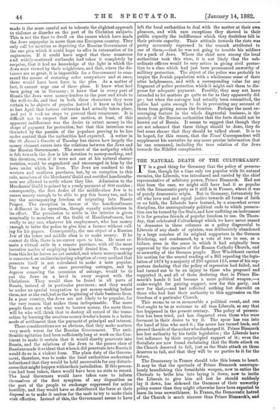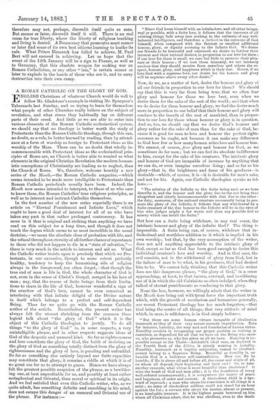THE NATURAL DEATH OF THE CULTURKAMPF.
ir is a good thing for Germany that the policy of persecu- tion,, though for a time only too popular with its natural enemies, the Liberals, was introduced and carried by the chief
representative of arbitrary power, Prince Bismarck. Had not that been the case, we might still have had it as popular with the Democratic party as it still is in France, where it was of purely democratic origin. But in Germany, fortunately for all who love real and equal justice towards all forms of faith or no faith, the Liberals have learned, by a somewhat severe discipline, the unscrupulously political ends to which persecu- tion can be turned by the State, and how unfitting an instrument it is for genuine friends of popular freedom to use. On Thurs-
day, that celebrated Culturkampf which we have never ceased to denounce in these columns as a policy disgraceful to Liberals of any shade of opinion, was deliberately abandoned by a large number of its original supporters in the German Reichstag, and condemned, by a vote of two to one, as a failure, even in the sense in which it had originally been approved by the enemies of the Roman Catholic Church, and as unworthy of the German people. Herr Windthorst carried his motion for the second reading of a Bill repealing the legis- lation of 1874 by a majority of 233 against 115, some of his sup- porters declaring that the policy of repression had failed, and had turned out to be an injury to those who proposed and supported it, and all of them declaring that in Prince Bis- marck's hands it had become a mere political weapon,—a make-weight for gaining support, now for this party, and now for that,—and had reflected nothing but discredit on those who had lent their authority to this aggression on the freedom of a particular Church. This seems to us as memorable a political event, and one that ought to be as welcome to all true Liberals, as any that has happened in the present century. The policy of persecu- tion has been tried, and has disgusted even those who were foremost in their desire to try it. The spear has run into the hand of him who used it ; the arrow has turned back, and pierced the side of the archer who discharged it. Prince Bismarck has lost authority by his futile legislation ; the Liberals have lost influence by their unprincipled support of it; even the Socialists are now found exclaiming that the State attack on the Church deserved to fail, just as the State attack on them deserves to fail, and that they will be no parties to it for the future.
The Democracy in France should take this lesson to heart. It may be that the spectacle of Prince Bismarck unscrupu- lously brandishing this formidable weapon, now to entice the Clericals to bribe him into laying it down, now to incite the Liberals to give him aid lest he should suddenly lay it down, has sickened the Germans of their unworthy policy sooner than they might otherwise have been expected to learn its true unworthiness. In France, the Democratic hatred of the Church is much sincerer than Prince Bismarck's, and
therefore may not, perhaps, discredit itself quite so soon. But sooner or later, discredit itself it will. There is no real room for true liberty, where the liberty of religious teaching and living is denied. A Democracy that persecutes must sooner or later find some of its own best citizens learning to loathe its rule. What Prince Bismarck has failed to achieve, M. Paul Bert will not succeed in achieving. Let us hope that the event of the 12th January will be a sign to France, as well as to Germany, that this obsolete weapon for making war on Roman Catholicism, or any other " ism," is certain sooner or later to explode in the hands of those who use it, and to carry destruction into their own camp.







































 Previous page
Previous page